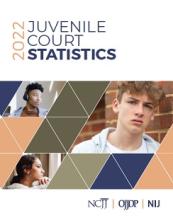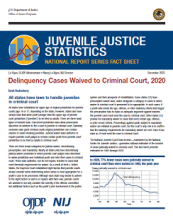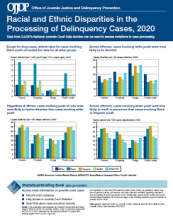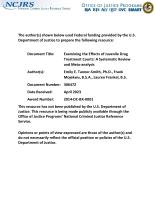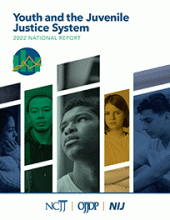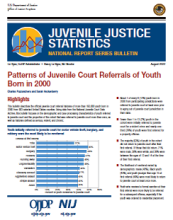Youth courts
Advancing Denver’s Handgun Intervention Program through Action Research
Delinquency Cases Waived to Criminal Court, 2020
Racial and Ethnic Disparities in the Processing of Delinquency Cases, 2020
Implementing School Based Youth Courts in a Rural Context: The Impact on Students Perceptions of School Climate, Individual Functioning, and Interpersonal Relationships.
Examining the Effects of Juvenile Drug Treatment Courts: A Systematic Review and Meta-analysis, Final Report
Youth and the Juvenile Justice System: 2022 National Report
The Benefits, Risks, and Challenges of Get-Tough and Support-Oriented Approaches to Improving School Safety
Patterns of Juvenile Court Referrals of Youth Born in 2000
JDTC Evaluation Brief: Baseline and Service Data from Ten Sites Using Needs Based Assignment
Research on Juvenile Court Intake Practices and Reoffending
Dual System Youth: At the Intersection of Child Maltreatment and Delinquency
Across the country, child welfare and juvenile justice systems now recognize that youth involved in both systems (i.e., dual system youth) are a vulnerable population who often go unrecognized because of challenges in information-sharing and cross system collaboration. In light of these challenges, national incidence rates of dual system youth are not known.
See the YouTube Terms of Service and Google Privacy Policy
The Convergence of Race, Ethnicity, Gender, and Class on Court Decisionmaking: Looking Toward the 21st Century
Priority Prosecution of the Serious Habitual Juvenile Offender: Roadblocks to Early Warning, Early Intervention, and Maximum Effectiveness -- The Philadelphia Study
The Impact of Teen Court on Rural Adolescents: Improved Social Relationships, Psychological Functioning, and School Experiences
Violent Offending Among Juveniles: A 7-Year Longitudinal Study of Recidivism, Desistance, and Associations With Mental Health
Kentucky Juvenile Justice Reform Evaluation: Implementation Evaluation Report
Try Again, Fail Again, Fail Better: Lessons from Community Courts
Change doesn't come easy, particularly within an institution as large and complex as the criminal justice system. Greg Berman, Director of the Center for Court Innovation, offered lessons from several efforts to make reform stick in criminal justice settings. In particular, he focused on the development of community courts — experimental court projects that are attempting to reduce both crime and incarceration in dozens of cities across the U.S. and around the world.
See the YouTube Terms of Service and Google Privacy Policy
Children as Citizens: Engaging Adolescents in Research on Exposure to Violence
Since the adoption of the United Nations Convention on the Rights of the Child in 1989, great strides have been made in the areas of child protection and advocacy. However, the concept of children, and specifically adolescents, as functional and engaged citizens has also emerged. Through the guidance and recognition of adults, children can participate in deliberative democracy as legitimate and competent citizens. This citizenship, like that of adults, can be used to enrich and improve local communities by creating a sense of ownership and fairness. Dr.
See the YouTube Terms of Service and Google Privacy Policy


